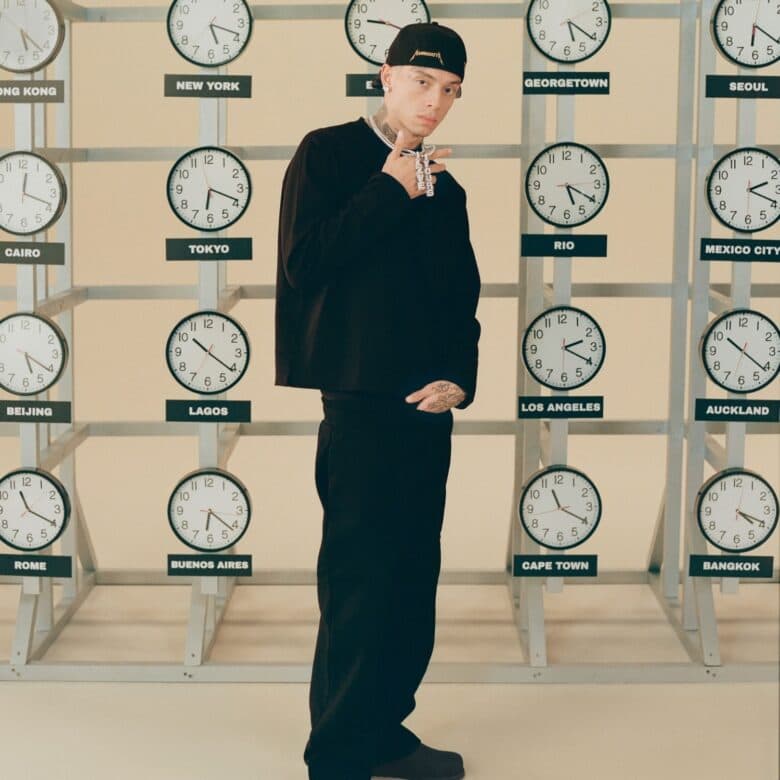DJ Target on vinyl rituals, grime’s misunderstood legacy and why radio still matters

When you think about the voices that shaped UK music from pirate sets to prime time, DJ Target’s name sits front and centre. The east London legend, one of grime’s original architects with crews such as Pay As U Go Cartel and Roll Deep, has spent over two decades breaking artists, championing underground sounds and — true to form — finding ways to slow us down for a moment of deep listening.
Recently, he teamed up with Monkey Shoulder Whisky and KEF Audio for a special pop-up, where he curated an exclusive vinyl selection alongside Katy B and DJ Arthi. As he looks back on twenty years of Roll Deep, the timeless power of radio and fatherhood’s impact on his legacy, DJ Target speaks to HUNGER about the roots, the rituals and the community that keeps him spinning.
You’ve always had an ear for what’s next, but you’ve also talked about slowing down and curating something more personal. What story were you trying to tell with your Monkey Shoulder vinyl picks?
I wanted my vinyl picks to really reflect my journey over the last twenty-plus years. We only had a short moment to do it, but those ten tracks capture discovering vinyl at an early age, falling in love with jungle music, becoming a DJ, then moving through jungle, garage, and eventually grime with Pay As U Go Cartel and Roll Deep. I’m into everything in between, too, so I wanted the selection to feel upbeat — like something you could hear in the club — but that still tells that story. Hopefully people enjoyed that.
In an era of infinite scrolling and disposable sound, why does deep listening still matter?
Everything now is so skippable and disposable. Attention spans are gone after fifteen seconds. Sitting down to play a vinyl record forces you to retune your brain and focus properly. That moment when you hear the crackle at the start, before the track kicks in, it’s therapeutic. It’s a whole process — taking the vinyl out of the sleeve, smelling it, checking the artwork, putting it on the turntable, dropping the needle. You can’t just skip that. I think more people could benefit from sitting and doing that once a week. It brings you back to a different level of attention and appreciation.

Roll Deep’s debut album just hit its twentieth anniversary. When you think back to those early days, was there a moment you realised you were part of a movement?
Yeah, it’s flown by! We’ve just marked twenty years since In at the Deep End. Looking back, especially when I was writing [my book] Grime Kids, you really see the scale of what we created. But at the time, none of us knew how big it would get. We were just trying to get heard locally. Then the stages got bigger, the radio sets got more love, the names got bigger. There were definitely moments on stage when we felt we were carving out something totally new and inspiring people. We realised early on that we weren’t afraid to take risks, and people respected that. But none of us could have predicted how far it would go.
Radio’s always been your spiritual home. Does it still have the power to break artists in the TikTok age?
I get asked this a lot. The world’s so fast-paced now with TikTok, streaming and social media, but that actually gives radio an even stronger USP. You can’t get that one-to-one connection anywhere else. That sense of community, the trust, the bond between a listener and a presenter, you can’t replicate that with an algorithm. Listeners trust me to bring them new artists and the best music. That relationship is priceless and gives radio the power to cut through the noise. The biggest artists right through to brand new talent, still want radio play — maybe even more so now because it helps them stand out in such a crowded space.
Do you feel the mainstream still struggles to really get grime?
Yeah, definitely. It’s a bit like drill today. When we first came up, people didn’t really get grime. It was seen as noise or something negative for the community. But look how far it’s come — you’ve got Stormzy headlining Glastonbury, which is huge progress. But I still think, deep down, people don’t fully understand it. They haven’t looked beneath the surface. The audience and the people made grime what it is, and the influence goes way beyond just 140 BPM. I think the industry will always try to figure out what grime is, what’s inspired by it and who counts as a grime artist, but I’m just proud of the impact it’s had.

You’ve spoken about grime’s DIY roots. Do you think young creatives today are missing that energy?
I do miss the DIY grime era. It was raw, and we were figuring it out as we went. That made us resilient. By the time any of us hit the mainstream, we were ready — for the stage, TV, whatever. Now, everything moves so fast. You can make a song today, go viral tomorrow, and be signed by next week. It’s still DIY in a way, but the foundations are different. I think that old-school “just do it for the vibes” spirit is coming back, though. People miss that rawness. There’s always room for evolution, but that DIY grind energy will always have a place.
Has fatherhood changed your relationship with music?
Without a doubt. Becoming a dad is the biggest shift in anyone’s life. It changes your whole outlook. My daughter’s so musical, and seeing her singing, dancing and even doing little rap freestyles is amazing. It’s given me a renewed relationship with music and inspired me to finally start working on my album. She’s my biggest inspiration and, honestly, she’s the legacy above everything else I’ve done in music.
And your baby food brand, Eden’s Bloom — where did that come from?
Eden’s Bloom was born when we realised, as new parents, that there was nothing truly healthy and tasty on the market for weaning babies — so much sugar, sweeteners, preservatives. We fell down this rabbit hole of research and development, and after nearly three years we launched Eden’s Bloom, the UK’s first and only freeze-dried baby food, made with only natural ingredients. No preservatives, no added sugar, just nutritious and tasty blends. It’s still early days, but the response has been amazing. We just wanted to give people a real healthy option, not just ‘healthy’ in name only.
- WriterCherelle Chambers




